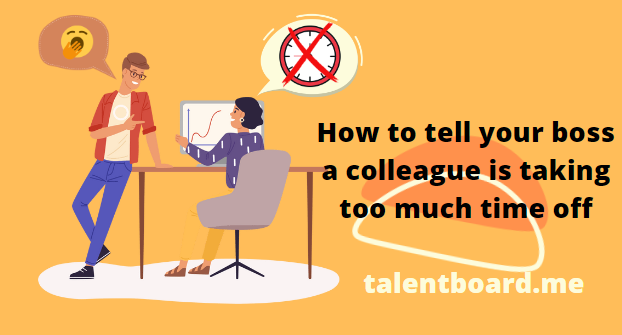The success of an organization is directly proportional to the success of its employees, and nothing is more detrimental to that success than employee absences. A coworker always taking time off can make you depressed and overwhelmed.
The abuse of sick leave is an issue in many firms, and the implications include lost production and decreased worker morale.
The ramifications of this problem include lost output and lost morale. There are solutions to this issue that can be implemented if you observe negative patterns of absenteeism at work shared by particular employers.
If a coworker of yours is frequently treading on your toes, you need to bring it to their attention, even if it may be difficult and uncomfortable to do so.
Keep in mind that you should be polite but firm, and make sure to offer concrete examples in your interaction with the coworker so that they understand what you are talking about.
How to deal with a coworker always taking time off
There is nothing you could say about a coworker who is absent that would not come out as whiney and devoid of any sense of team spirit.

It is also not your concern to deal with. You are struggling with a management issue at the moment. When a teammate is absent, your workload likely increases.
Therefore, you should focus on reducing it. There is a possibility that you are unaware of something that is taking place behind the scenes. One of your coworkers may be dealing with an ailment that entitles her to many sick days.
Collaborate with your supervisor on managing your workload, but ignore anything else. It is not your responsibility. It belongs to the corporation. Let it be.
Discussing the issue with your colleague
You should establish clear limits if a coworker seems uninterested in your issues.
It is time to voice your concerns if the actions of a coworker are having an impact on your work. However, you shouldn’t sneak up on him, and you shouldn’t assume an accusatory tone.
You should ask your coworker if the two of you can talk and, if possible, do it in a private area of the building.
Maintain a disposition of open-mindedness as you join the conversation. Keep your attention fixed on the end objective, whether to win back people’s trust or to secure your position as the top dog.
Also, be prepared to listen to what he has to say about the circumstance and why he acted the way he did after you’ve each presented your point of view to the other, and deliberate with one another about how to address the problem.
Complain to the manager about your workload
Many managers won’t know you’re experiencing feelings of being overloaded and overworked until you raise your concerns. After all, they are not, hopefully, spending the entire day peering over your computer or maintaining detailed records of every assignment you have.
This implies that if you already have too much on your plate, you need to make your voice heard if you want things to change.
Have an open and honest discussion with your supervisor if you feel you are being overworked. Consult with others and get their support. Be open-minded.
If your manager is unreceptive, you will need to take care of the problem on your own and practice declining the offer. Of course, if things get unbearable, you should know that other employment alternatives are available.
You will never be in a bind. If you quit taking up the slack when others aren’t doing their share at work, your coworkers will start doing what they’re supposed to be, or your manager will notice and take action.
How to tell your boss a colleague is taking too much time off
It would help if you talked with your boss as soon as possible rather than waiting till later. There are occasions when supervisors fail to see problems with employee performance because other workers can make up the difference.
Set up a one-on-one chat with your boss so the two of you can discuss your worries about employees slacking off on the job.
Your encounter with your supervisor should not be hostile, even though this goes against common sense. Your tone must be respectful, diplomatic, and polite at all times.
Ask your boss for advice on coping with coworkers who don’t pull their weight in the workplace.
Express your concern that the quality of your work may begin to suffer because you’re finding it difficult to complete more than your allotted portion of the work.
When you’re working together on a project with a strict deadline, it’s a good idea to get some advice on prioritizing tasks when you can’t trust your lazy coworker to complete their assigned tasks.

Present Factual Evidence
Your manager may conclude that you are trying to cause trouble and stir up controversy if you don’t have evidence to back up your assertions and if you don’t have.
Before taking up the matter with the manager, you should try to demonstrate that you attempted to sort things out with your colleague first.
The limit your coworker can be on sick leave (USA laws)
There are currently no legally mandated standards for paid sick leave at the federal level. The Family and Medical Leave Act (FMLA) stipulates that enterprises subject to its provisions must grant their employees unpaid sick leave.
The Family and Medical Leave Act (FMLA) permits employees to take up to 12 weeks of unpaid leave to care for themselves or a member of their immediate family in certain severe medical conditions.
Often, paid leave may frequently be an acceptable replacement for unpaid FMLA leave.
Employees are eligible to take FMLA leave if they have worked for their employer for at least 12 months, have worked for at least 1,250 hours over the previous 12 months, and work at a location where the employer employs at least 50 employees within 75 miles.
In addition, employees must work at a location where the employer employs at least 50.